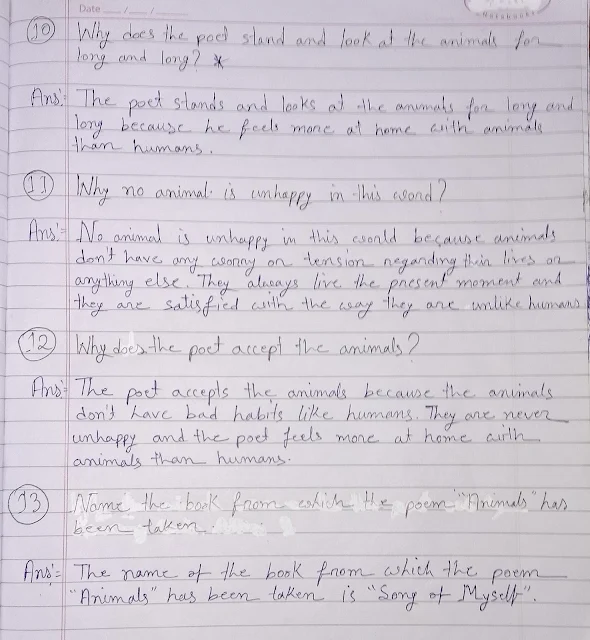A Letter to God Class 10 All Questions and Answers
Short Answer Questions:
Q1. Who was Lencho? What were his main concerns?
Ans: Lencho was a poor farmer who lived with his family on a small hill. His main concern was the survival of his crops, which were essential for his family’s livelihood. He depended entirely on his harvest, and when a hailstorm destroyed his crops, he became deeply worried about his family's future.
Q2. Why did Lencho write a letter to God?
Ans: After the hailstorm destroyed his crops, Lencho was devastated. He had immense faith in God and believed that only God could help him. Therefore, he wrote a letter to God requesting 100 pesos to support his family and replant his crops.
Q3. What was the reaction of the postmaster after reading Lencho’s letter?
Ans: The postmaster was initially amused to see a letter addressed to God. However, he was impressed by Lencho's faith. To help Lencho, he decided to collect money from his colleagues and friends and send it to Lencho as a charitable act.
Q4. How much money did the postmaster collect? Was it sufficient for Lencho?
Ans: The postmaster managed to collect 70 pesos from his colleagues and friends. However, this amount was not sufficient for Lencho, who had requested 100 pesos.
Q5. What was Lencho’s reaction upon receiving the money?
Ans: Lencho was not surprised to receive the money because he had complete faith that God would help him. However, upon counting the money, he became angry as it was less than what he had requested. He believed that the post office employees had stolen a part of the money.
Q6. What did Lencho write in his second letter to God?
Ans: In his second letter to God, Lencho requested the remaining money he needed. He also asked God not to send the money through the post office, as he believed that the employees were dishonest and had stolen part of the money.
Q7. What lesson does the story “A Letter to God” teach us?
Ans: The story teaches us about the power of faith and trust. It also highlights human kindness and generosity, as shown by the postmaster. Moreover, it portrays the irony of life, as Lencho mistrusts the very people who helped him.
Q8. Why is the story titled “A Letter to God”?
Ans: The story is titled “A Letter to God” because Lencho’s deep faith in God drives him to write a letter seeking divine help. The title reflects the central theme of the story—faith and hope in difficult times.
Long Answer Questions:
Q1. Describe Lencho’s character in detail.
Ans: Lencho was a hardworking and dedicated farmer who lived with his family in a rural area. He had immense faith in God, believing that God would always help him in times of need. Despite facing hardships, he remained optimistic and hopeful. His letter to God shows his innocence and simplicity. However, Lencho also displayed a lack of trust in humans, as he suspected the post office employees of stealing the money. His character teaches us the value of unwavering faith and hope.
Q2. Explain the role of the postmaster in the story.
Ans: The postmaster played a significant role in the story. Initially, he found Lencho’s letter amusing. However, upon realizing Lencho’s deep faith in God, he decided to help him. He collected money from his colleagues and friends to fulfill Lencho’s request. The postmaster’s actions reflect human kindness and compassion. Despite Lencho’s mistrust, the postmaster’s efforts highlight the importance of helping others in need.
Q3. Discuss the theme of faith and humanity as depicted in the story “A Letter to God”.
Ans: The story “A Letter to God” primarily revolves around the themes of faith and humanity. Lencho’s unshakable faith in God drives him to write a letter seeking help. The postmaster and his colleagues’ efforts to help Lencho showcase human compassion and kindness. However, the story also presents an irony—Lencho mistrusts the very people who help him. The story teaches us that faith can inspire people to act selflessly, and that humanity can restore hope in difficult times.
Q4. What is the irony in the story “A Letter to God”?
Ans: The irony in the story lies in the fact that Lencho, who had immense faith in God, lacked trust in humans. He believed that God had sent him the money, but he suspected the post office employees of stealing part of it. In reality, the postmaster and his colleagues were the ones who had collected the money to help him. This irony highlights the gap between faith in divine power and trust in fellow humans.
Q5. How does the story “A Letter to God” portray rural life and its hardships?
Ans: The story portrays rural life as one filled with hardships and uncertainties. Lencho, a farmer, depends entirely on his crops for survival. The destruction of his crops by a hailstorm represents the vulnerability of farmers to natural calamities. The story highlights the challenges faced by rural people and their dependence on faith and community support to overcome difficult times. It also shows the simplicity and innocence of rural life, as reflected in Lencho’s actions.
Science In Everyday Life Essay Writing | Important Essay Writing 2022



















































